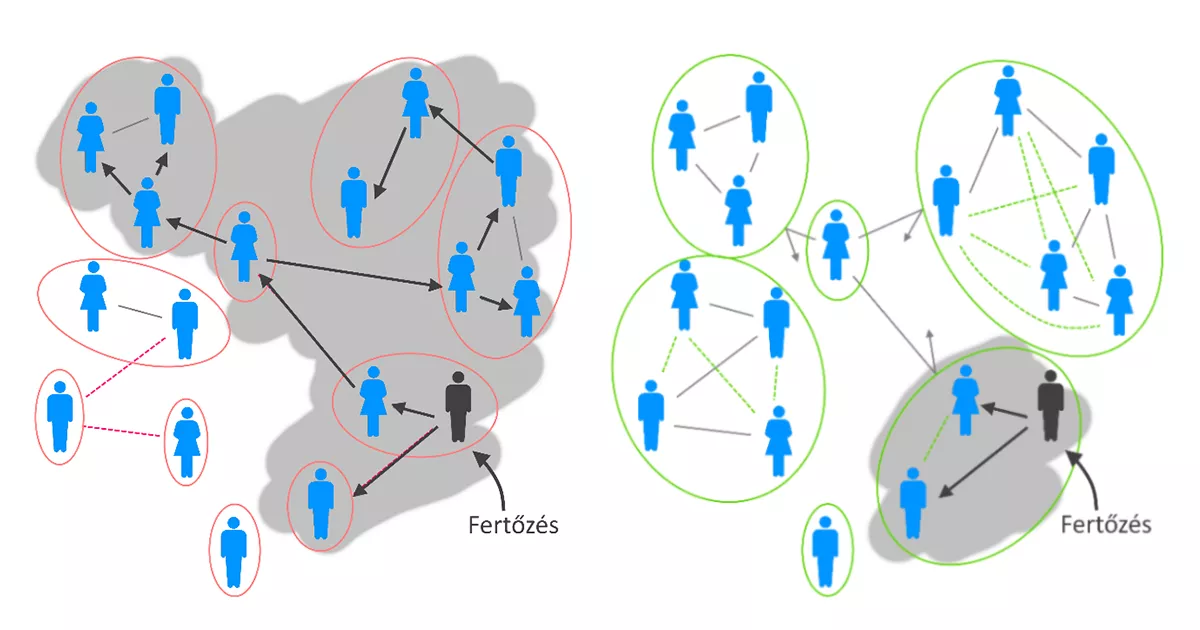A recent study at the Institute of Economics of the Centre for Economic & Regional Studies (KRTK) at ELKH examines cooperative games where interactions between coalitions take place through a network that players can otherwise shape themselves. If the members of society differ only in their social needs, then society is naturally divided into roughly homogeneous groups according to this characteristic, where the night watchmen form smaller groups and the prima donnas create larger groups. Thus, in the time of an epidemic, all members of society receive the optimal combination of social life and the associated risk of infection.
The global coronavirus epidemic has changed our daily lives in several respects. We wash our hands regularly and wear masks in public transport, shops and offices to prevent infection during such necessary, accidental encounters. However, at the time of the lockdown, we were allowed to stay in one place only with members of our household.
The latter caused innumerable difficulties. Think of the elderly in need of care – obviously, we should not stop caring for them – or young families where grandparents help them out regularly and do not want to give up on their grandchildren because of the coronavirus, or think of single people, for whom this restriction is much like solitary confinement. Regardless of the size of the household, we may rightly feel that such a restriction on our social lives no longer meets our needs, and after a full day of video conferencing with colleagues, we no longer want to meet our friends in the same way.
Disciplined people adapt to the circumstances and tend to become depressed, while others, taking the risk of infection, breach the restrictions. It’s hard to condemn them for this: over the millennia, man has become so accustomed to living in a large crowd with his peers that he can’t stand being alone today. Of course, a night watchman and a prima donna require company to a different extent, but this need rarely matches the size of their household. As a result of such offenses, the epidemic also spreads among households and, through some offenders, it can reach a large part of society (see figure belowon the left).
The so-called 'virus bubble' can provide a solution to this problem. The essence of this system, which has been formally introduced in several countries (New Zealand, Canada), is to create a circle of companies (a 'bubble') whose members are in contact with each other, but not with others, or only to the extent necessary. A virus bubble, by definition, consists of one or more households and provides an opportunity to care for an elderly grandmother (she should be included in the bubble) or joint programmes with a group of friends (if they are all members of the bubble). In general, we can say that this method satisfies social needs to a much greater extent, and thus, without external contact, the infection does not spread from bubble to bubble.

The virus bubble is based on mutual agreement and is thus an exciting field of application for cooperative game theory dealing with exactly such groups, so-called coalitions. At the same time, it is important to recognize that the risk of infection depends not only on how many and who are members of the virus bubble or what virus bubbles are created around us, but also on the network of relationships that are actually live. Relationships are shaped by individuals, taking into account the pros and cons of face-to-face contact. If the company offered by the bubble is not enough, and someone would take the risk of infection for another external contact, it would be more appropriate to form a larger bubble.
A recent study by the KRTK Game Theory Research Group examines cooperative games where interactions between coalitions take place through a network that players can otherwise shape themselves. If the members of the society differ only in their social needs, the society is naturally divided according to this property into roughly homogeneous groups, where the night watchmen form smaller groups and the prima donna form larger groups. Thus, every member of society receives the optimal combination of social life and the associated risk of infection.
Real life is much more exciting and complex than this, but the results provide many lessons in practice. The virus bubble is an effective and proven antidote to the epidemic, in case members only have personal contact with the other members of the bubble and if they try to keep this circle of friends as close as possible. So, the motto of an effective virus bubble is: small and exclusive.
Author: László Á. Kóczy (Game Thory Research Group, KRTK)